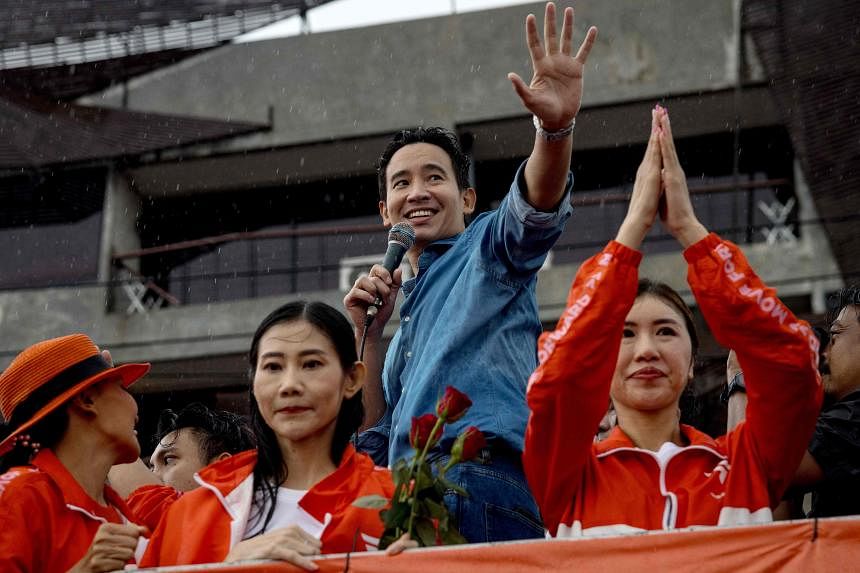
BANGKOK - Pumping his fist into the air, Mr Pita Limjaroenrat walked out of Parliament’s chambers on Wednesday in the midst of proceedings, while fellow party and coalition members stood in applause.
Moments before, the 42-year-old leader of the Move Forward Party (MFP) had said in his parting address: “I think Thailand has changed drastically since May 14. The people have already won half the battle, and there is still halfway to go.”
Maybe, his optimism was misplaced.
Mr Pita is under a temporary suspension of his parliamentary duties by the Constitutional Court pending its ruling over his ownership of media shares, which is forbidden under election law.
“I’ll be back,” Mr Pita wrote on social media shortly after leaving Parliament, even as lawmakers continued to debate whether he should get a second shot at the premiership.
But the reality was that he would not be back, at least not in his desired position as Thailand’s 30th Prime Minister. Later that evening, a majority of parliamentary voters denied him a second attempt at nomination for the post.
Now, his party is fighting for its place in the coalition it had assembled after winning the most seats in the May election. It has been a turbulent two months since the reformist MFP and its Ivy League-graduate leader shot to the top of the political arena, beating more established parties to bag 151 seats in the 500-member elected House of Representatives.
Its victory was powered by widespread desire for change, in a country that has experienced comparatively sluggish post-pandemic recovery, high household debt and more than a dozen military coups, with the most recent in 2014 by now-caretaker PM Prayut Chan-o-cha.
One female voter in her 60s, a former supporter of conservative parties who decided to throw her support behind the MFP this time around, said: “It’s about having new people in charge. I don’t necessarily support all the MFP’s policies, but something must change.”
With the backing of main coalition partner Pheu Thai and six smaller parties, the MFP entered uncharted territory as it tried to lead the 312-member alliance in establishing what it termed the “People’s Government”.
However, the legal threats as well as the entrenched conservative forces that oppose the party’s seemingly radical policies have meant challenges at every turn.
“We have to apologise to the people and frankly admit that they (those in power) do not want MFP to be a core party to form a government,” said MFP secretary-general Chaithawat Tulathon on Friday, noting that opposing voices have cited the party’s stance to amend Section 112 of the Criminal Code – the lese majeste law – and loyalty to the monarchy as reasons to block the party from Government House.
https://news.google.com/rss/articles/CBMihwFodHRwczovL3d3dy5zdHJhaXRzdGltZXMuY29tL2FzaWEvc2UtYXNpYS9hZnRlci13aW5uaW5nLWFuLWVsZWN0aW9uLW1vdmUtZm9yd2FyZC1zLXF1ZXN0LXRvLWxlYWQtdGhhaWxhbmQtcy1nb3Zlcm5tZW50LWdyaW5kcy10by1hLWhhbHTSAQA?oc=5
2023-07-22 14:48:00Z
2186008497
Tidak ada komentar:
Posting Komentar